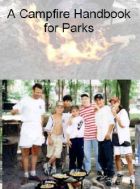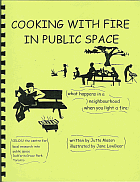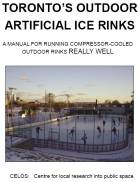

Pages in this Folder:

Related Folders:
See also Department Site Map
Support Provided by

Toronto Parks and Trees Foundation

This website has received support from celos.ca through the Trillium foundation.
Publications
Comments?
For the basics, see
- Website & Privacy Policies
- How To Get Involved
- The Role of the Park
Search options:
Department Site Map
Custodians:
< Chapter Nineteen | Stories List | Chapter Twenty-one >
Winter Story
The making and unmaking of Dufferin Grove Park.
A summer serial, continuing into the fall and winter, December 1, 2011, Chapter Twenty
By: Jutta Mason
Recap: Dufferin Grove Park is doing things that don’t fit the city’s policies, says the current management of Parks, Forestry, and Recreation (PFR). According to a staff report obtained through Freedom of Information, the way the park is run leaves the city “vulnerable and open to major risk factors.”
Since last May, a new recreation supervisor has been tasked with dissecting out the traditional recreation activities from the many “programs that represent anomalies for PFR.” Despite this, the Dufferin Grove anomalies are stubbornly clinging to life, as the rink season begins.
In Chapter 18 I wrote about the PFR policy-writers’ draft bake oven/tandoor policy. It says that if anyone is caught using a community oven without a permit, they’ll be fined $300. Bakers will need permits to use bake ovens for running community programs or events, or even just for learning how to bake with wood. These ideas were the run-up to the proposed City budget for 2012, which has now been released in draft form.
At the end of the last chapter, I wrote that I want to turn my attention to the story of the neighbourhood, and how the park is formed by – and in turn forms – the wider place that surrounds it. But that story has to wait a little longer, since the budget is crowding to be first.
Toronto’s proposed operating budget for 2012 is $9.35 billion. A number that large can’t really be comprehended. The PFR operating budget is $377 million. Still hard to grasp! And it’s not only tricky for us ordinary people. Obviously the flotilla of specialised number-crunchers employed by the city had trouble too – or else why would they have predicted a shortfall of $774 million when it now turns out that the city has a surplus of $180 million?
In this budget of almost $10 billion, what happens at Dufferin Grove is singled out for special mention. I only found this out when I resolved to try and give the PFR portion of the operating budget a close reading. Some difficult things have to be attempted, even by some non-specialist, ordinary people. I wanted to know: how are our taxes being used to take care of our public commons? As I went through the 58 pages of tables and bullet-points, I looked for landmarks that could connect me to the familiar terrain of our neighbourhood park. I found more than I expected. This chapter will take us back and forth between the general and the particular elements of the budget. It’s a bit of a rough ride.
PFR is requesting $377.3 million in operating funds this year, which will allow for 4,160 staff. Last year, less money ($369.4 million) allowed for more staff (4,243). But each year the staff wages, both management and union, are compounded by increases that add up fast. And the higher the wages are, the faster they increase.
Of this $377.3 million, $72.5 million is expected to come from next year’s user fees. There are some federal and provincial subsidies too, and a mysterious $11 million that comes from “Sundry revenues” (presumably including the local PWYC donation cash and cheques that have been going to the City via CELOS since June ). The lion’s share of the funds to run PFR – $267.4 million in 2012 – comes from our taxes. But it’s not enough, say the budget analysts. There is a constant refrain in the budget – in addition to the tax funds, the city must “recover” more of the expense of operating the parks and community centres.
Why is $267.4 million not enough? We know that Toronto is a big city, with a lot of trees to plant and chop down, and a lot of picnic benches and gyms and swimming pools and skating rinks. Of course it costs a lot. It must be true that running a city is not like running a household – the scale is so huge, and there are so many details, interacting with each other. But it’s hard not to be puzzled anyway, and hard to get answers. Even the grass-roots costs are a mystery. When we recently asked through Freedom of Information about the budget for each of four larger neighbourhood parks, we were told that the information is usually not available by individual park. The City’s recent User Fee Policy requires a “full cost accounting” for every program, but that won’t be ready until 2013.
Meantime, though, there are some troubling details in the 2012 PFR Budget, when “full cost recovery” is linked to “full cost accounting.” For example, on page 27: “Instructional skating programs recover 100% of direct program costs but recover less than 40% of their costs when considering all divisional direct and indirect support costs.”
Another word for “divisional costs” is “administration.” And this is where we can get to a connection with Dufferin Grove Park – an on-the-ground story about these “divisional costs,” leading us back to the unmaking of the park at the same time.
Only a few years, ago, the “program” part of Dufferin Grove was run by the city staff who worked there, with lots of nudges from park users. The local staff could refer to their supervisor when they wanted help, but on the whole, they did everything, including the paperwork. As park users know, that direct approach has gradually crumbled. The supervisor was told he had to stop dealing with the park staff directly. So he assigned a “community recreation programmer” to do some of the paperwork. Even so, the supervisor was removed from Dufferin Grove and re-assigned to deal with caretakers instead of park users. A different supervisor replaced him. This new supervisor in turn was relocated and replaced by a North York supervisor who was prepared to go all the way in adding new administrative layers to the park, to “harmonize” it with the rest of the city.
But old habits die hard. Dufferin Grove staff were still used to doing things themselves, and besides, the new administrative layer was pretty rusty at dealing with the day-to-day. In the past month, the staff began to set up the three Ward 18 rinks, and the way they did it got them into more trouble than even their activities last summer.
The big offenses were that (1) the park program staff were used to signing in on their pay sheets for the work hours they needed to prepare the rinks, and (2) that they decided collaboratively who should do the different jobs. If they were doing a pre-season kitchen cleanup at Wallace Rink clubhouse, they might add an extra hour or schedule a staff person who was especially good at putting up a kitchen shelf. They took care to stay within the park budget, but within the budget “envelope,” they allocated the shifts to fit the work that needed doing.
The supervisor called this “self-scheduling,” and forbade it. The rink coordinators were required to send the supervisor minutely-detailed accounts of what they did every day. Then the supervisor would assign shifts based on her understanding. All work had to be pre-assigned and scheduled by full-time staff. If anyone worked an hour longer than they had been pre-scheduled to work by the supervisor, she said, they wouldn’t be paid. When a cleanup project was done, if the staff finished an hour early and signed out, they could be summoned for an interview to explain this “irregularity in staff assignment.” Any changes had to have prior clearance from full-time staff – and if it was evening, the clearance had to come from a central duty supervisor who had no idea where the park was even located. “Hello, may we stay an extra hour to clean the washrooms, because we had over 300 rink users today and we didn’t have time until now?” The duty supervisor could say yes or no, and would have to fill out a report, and send it in.
After the park supervisor had slotted all the work descriptions into the shifts she thought would fit best, each park staff received a letter warning her or him that nothing must be done without “proper authorization,” and that “all work assigned and scheduled by full time City staff is to serve articulated PFR purposes, and quantified in advance.” Any shift trades between two staff had to receive advance approval and replacements must come from an “authorized Relief List...in order of seniority.” The park staff are all members of CUPE Local 79. They had been used to trading shifts as needed, so that staff worn out from dealing with Dufferin Rink crowds could get a break, and the work could get done. Now their supervisor – not, of course, in the union – took over the task of interpreting and enforcing her version of the collective agreement. Keeping to the rules as they were presented by the supervisor was more important than cooperation and mutual help among the staff to make things work.
The final word on how the park work was now to be transformed arrived in every staff’s home e-mail inbox at 1.30 a.m. on a Saturday morning. The letter gave park staff less than 48 hours to choose their winter rink shifts, emphasizing the scarcity of the most desirable shifts: “someone more senior than you could request one of your selections before we get to your name.”
The letters ended with a warning: “Persons paid by other agencies or employers, and community volunteers, may not perform work on City property that resembles any of the current work assigned to or performed by Recreation Workers.”
No more community gardens. No more volunteer skate coaches. No more guest cooks at supper. No more carpentry help from a park friend if a bench needed fixing, no more picnic table painting bees. No more joint efforts between park friends and staff, to counsel foolish rink rats who were making trouble. No more community campfire supervision. No more collaboration with the CELOS Trillium grant workers, to fix up the new rink kitchens at Wallace and at Campbell.
The supervisor and her full-time assistant must have spent many hours setting out the rules for every program staff person, having meetings, refining the rules, going after staff who didn’t seem to “get it,” poring over pay records to make sure that no one was being paid an extra $15 for unauthorized litter-picking or late-evening face-offs with stroppy youth. This latest attempt to “regularize” the park is one illustration of “indirect divisional costs” – why the direct cost of running a program at Dufferin Grove might be only 40% of its total cost to the City budget.
If the scenario of added administration is multiplied in a variety of small ways across the city, it’s no wonder that $267.4 million tax support for PFR is still not enough. To address this manufactured scarcity, the budget document proposes across-the-board cuts to staffing, increases in fees, and the invention of new charges for what was formerly tax-funded. PFR is going to cut 149 positions, although 67 of those were already vacant, so that means cutting more like 80. For example, there will be 17 fewer youth outreach staff, saving the city 17 x $79,000 in wages. There will be 5 fewer recreation support staff (I’m not sure what those are) saving the city 5 x $101,940. And there will be “harmonization of recreation support for Parks sites,” leading to a reduction of 5.2 staff, but saving the city only 5.2 x $33,653. The reason the pay is so low and there is a 0.2 staff person is that this number refers to part-time staff, perhaps many more than 5.2, with varying hours and very low pay.
And here the budget document itself goes from the general to the particular. The PF&R budget says these recreation support staff must be eliminated because their existence is “inequitable.....PF&R supports a number of special, community and cultural events held in city parks such as bake oven activities for which there is no cost recovery for staff time. This recommended minor service level charge will harmonise recreation support provided in City parks by having community event organizers rely more heavily on volunteers or collect special event support costs.” And further along the report includes “$0.004 million [$4,000] in additional revenue by introducing two new fees for outdoor bake ovens following Council approval. The outdoor oven fee will be $23.05 for Commercial/Private/Non-resident parties using an outdoor oven while Not-for-profit/Resident parties wanting to use an outdoor oven for community events will be charged $11.53. These new user fees will help the Program to recover user costs associated with outdoor oven usage and cleanup and therefore result in a net zero budget impact.”
Aside from the fact that to date there has been neither cleanup nor any other bake oven maintenance done by the City for many years, the idea that the City can make $4000 a year in permit fees by renting out its five community ovens is more comical than realistic. The Parks Committee even added a “naming rights” clause to its bake oven resolution. As it stands, the bake oven policy, in development since 2007 at a cost of minimally $60,000 for staff thinking-time, calls for park users to pay the whole tab (construction, operation, repairs, insurance). At the same time perhaps the city can sell the naming rights to Cadbury Chocolate? “Net zero,” indeed – who would agree to that?
The reaction of potential and past donours of bake ovens came pretty fast after the Star wrote a story. Alan Broadbent of the Maytree Foundation wrote: “Maytree was an early funder of the Dufferin Grove oven. It was never our intention in providing private funds for these public goods that a government would turn it into a cash grab. Such behaviour is dubious ethically and certainly a discouragement for other private funders who may be considering contributing to the public realm.”
David Rothberg, a long-time park friend who recently donated funds to finish the new Wallace and Campbell Rinks kitchens and to enlarge the skate lending program, wrote: “I understand the city intends to charge people to use bake ovens. I am not happy about that. If I ever donate funds to build a bake oven, I want the oven to be a gift. I want people to use it freely. I want my donation respected. I want the city to encourage me to continue to donate. Charging a fee to use an oven means that I’m not likely to donate for one.”
Of course, PFR’s plans for increasing its revenue extend far beyond eliminating part-time staff costs for public events and renting out park bake ovens. Back to the big picture: the community centres that currently offer free programs are set to charge for the programs now, requiring every program participant including children to take a means test if they want to take part in what’s listed in the “Fun guide.” But there’s a problem here too. Torontonians seem not to be very keen to pay for all the programs that PFR offers. People come if a program is free, but a goodly number of the paid programs are undersubscribed. Some of the classes are only three-quarters full, some even have to be cancelled. Still, enough people signed up last year even at the higher program cost that the total user fee revenue was listed as going up. The total number of participants may drop, but the revenue rises – to a point. The 2012 budget anticipates $132,000 more for permits and $380,000 more for registered programs.
But people may drift away from inferior programs. In a “Recreation Service level” table in the budget document, the only service level listed for recreation programs is “maintain compliance to specified instructor ratios.” For years now, PFR staff who run excellent programs with lots of people have been unrewarded. A community centre with many empty hours in its schedule is okay: it’s marketable to “third parties” who will pay leases to the city and do what they choose with public space.
There’s an expression for that approach: “penny wise and pound foolish.”
The dictionary page
Inequity:
This is the word used in the PFR draft budget to single out the Dufferin Grove approach for special attention. The tip-off is the definition of the problem: “PF&R supports a number of special, community and cultural events held in city parks such as bake oven activities for which there is no cost recovery for staff time.” In most city parks, recreation staff are rarely used to support drop-in programs any more. Dufferin Grove goes against the grain. This means that people in this neighbourhood get an “inequitable” service for their taxes. A good example is campfires. Because of recreation staff support for every campfire, there’s only a PWYC donation ($20 suggested) at Dufferin Grove. At the same time, neighbours gathering at Orchard Park across town are charged $136 ($82 for a permit and $54 private insurance, brokered by the City). They wanted to gather around a campfire to plan volunteer shifts for making a community natural ice rink in their park this winter. The same bill went to neighbours wanting to get together in an existing fire circle at Dovercourt Park. Also to friends of Christie Pits wanting to have their annual pumpkin campfire on November 1.
The City is not just trying to recover costs with such charges for community events – it’s trying to make extra money. If “cost recovery” were the only issue, the Dufferin Grove approach would work out for every park. The cost calculation was in Chapter 18 of this series: “at Dufferin Grove, from mid-May until Sept.30, campfire PWYC donations totalled $2224.75, deposited directly back into the city's revenues. The staff time for training community volunteers, set-up, telephone contact and clean-up amount to about 1 hour per campfire. There were about 140 campfires during that time, so at $14 an hour for staff, that means the cost of staffing was about $1960. $264.75 extra remained, to be put back into updating the city website's campfire information, into the city's self-insurance fund (for staff-led activities), and into the twice-yearly site cleanups.”
Why let 140 groups gather around a campfire when the City could be taking in the same amount of “profit” with less than four campfires? But the City is counting its chickens before they hatch. Very few groups will pay $136 to gather with their neighbours – not because they don’t have the funds, but because as taxpayers they resist being charged for the time they donate to set up such gatherings. So the real outcome of staff harmonization will more likely be no money for the city and no campfires for the neighbourhood.
And no part-time recreation staff in parks, to support neighbours willing to give their time and their imagination to enlivening their communities. The budget plan produces an equitable downward drift.
Resistance
The last page of these chapters is usually the money page. But because this chapter was about the budget, it was all about money. So this time I want to tell a resistance story. It won’t be the last.
PFR, like many (but not quite all) government bureaucracies, is set up somewhat like an army, with a strict hierarchy, and disciplinary action for those who don’t follow the many, many rules. This applies all the way up the line. Recently a PFR manager earning more than $100,000 was escorted out of his office, and his job, by police. It’s possible, but unlikely, that he was being charged with an offence. Because of privacy rules, the reason for his departure will probably never be made public. But the humiliation ritual was a very public warning to his colleagues.
At the bottom of the hierarchy are the part time staff, who make up most of the direct program staff in the recreation section of PFR, citywide. Management doesn’t need to find grounds for firing part-time staff – because they have no full-time positions, these staff can also be “de-scheduled” by their supervisors, meaning they lose some of their work shifts and therefore money to pay their rent. Under those circumstances, speaking the truth to power is daunting.
But sometimes it seems like there’s no choice, On Monday November 28, just in time for the 4 pm deadline set by the recreation supervisor, when all staff were to slot themselves into her revised work schedule, 22 part-time Ward staff sent her a joint letter.
They wrote: “We do not agree with the new shift assignment, wage rates and job descriptions that you propose...These shift assignments do not consistently reflect job descriptions, wages and overall programming that we know are necessary for operations to continue at Dufferin, Wallace and Campbell rinks.....We ask instead that you allow the [existing] rink coordinators to continue to schedule staff, by seniority, equitably, and staying within a budget, as has been our successful practice for many years. This is the only way to avoid mid-season disruption of services to the public.”
If a group of army privates sent such a letter to their captain, they might soon find themselves all sitting in a cell together. To their credit, PFR management treated this letter as a respectful request made by capable staff. The unmaking of the rink programs was postponed for two weeks, pending a closer examination of the rules used to justify the changes. One of the issues to be examined concerns the overall cost of the supervisor’s reworking of the schedule. At this moment it appears that although many of the senior staff would lose as much as $3 an hour in wages, the overall cost of the new plan would be higher. More in next week’s money page. And a return, next week, to the story of the neighbourhood.
Winter Story (2011) is published by the 'Centre for Local Research into Public Space (CELOS), www.celos.ca.
Illustrations by Jane LowBeer






 Printer friendly version
Printer friendly version